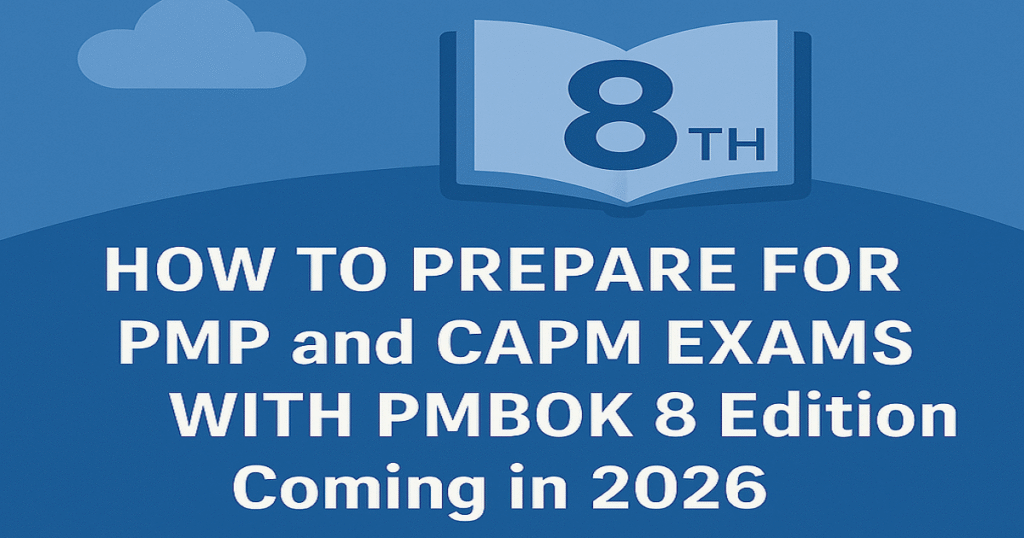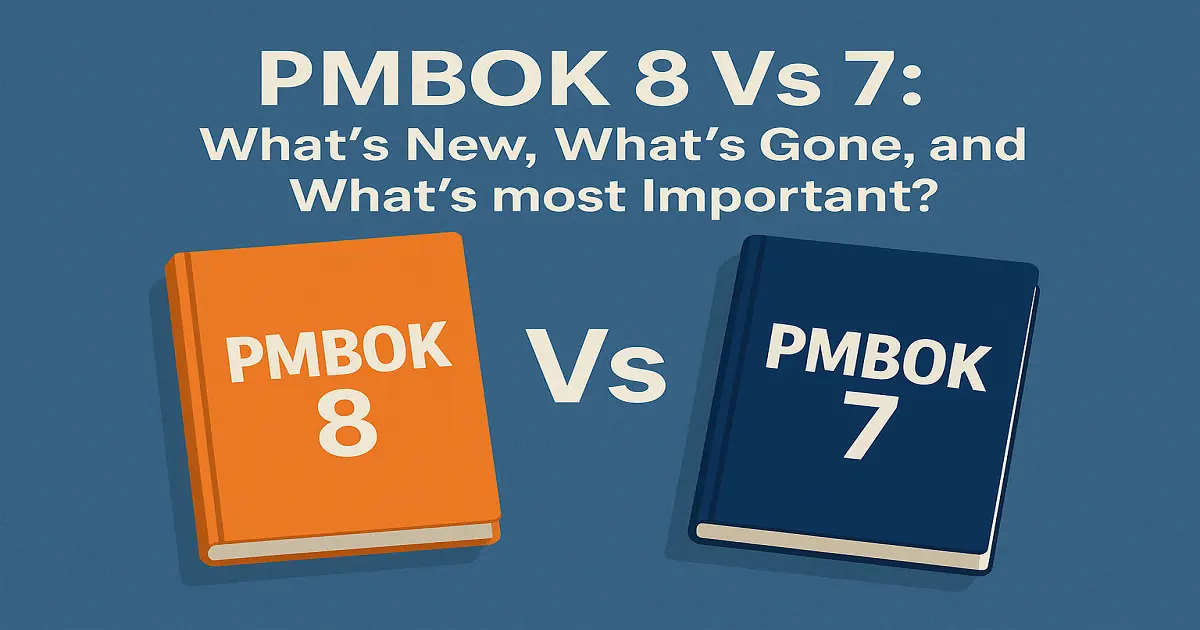PMBOK 8 Vs 7. The Project Management Body of Knowledge (PMBOK) Guide forms the foundation for all the global standards for project management. With the release to PMBOK’s 8th Edition in late 2025 PMP/CAPM managers as well as candidates are considering the new features as well as major changes compared to the revolutionary 7th Edition. This article is a thorough and high-value guide to the growth of PMBOK. It will highlight the most important modifications, changes and practical aspects for students and professionals equally.
Introduction: Understanding PMBOK’s Evolution
The PMBOK Guide has shifted from strict process documentation (6th Edition) to a more flexible and foundation-based structure (7th edition). The forthcoming 8th Edition builds on these changes, emphasizing digital transformation, data-driven decision-making, and heightened complexity, all to meet modern business and technology requirements.

Major Shifts PMBOK 8 Vs 7: At a Glance
| Aspect | PMBOK 7th Edition | PMBOK 8th Edition |
|---|---|---|
| Framework | Flexible, based on principles, driven by value | Expanded principles Digital transformation, complex |
| Principles | 12 guiding principles | Six fundamentals (streamlined as well as refined) |
| Performance Domains | 8 core domains (Team, Stakeholders, Development, etc.) | 7 domains driven by processes, with particular attention to outcomes |
| Process Groups & Details | Processes de-emphasized, more abstract | Process groups are reintroduced (like PMBOK 6), that can be implemented |
| Digital/Tech Emphasis | The reference to agile/hybrid/tech tools | The focus is on AI Machine learning, machine-learning Automation, and machine learning |
| Sustainability/Ethics | Coverage is limited | The principles of sustainability are firmly anchored in ethics |
| Value Focus | Value delivery, systems-thinking | Value creation as the main concept |
| Methodology Flexibility | Waterfall Flexible, hybrid-encouraged | Hybrid digital-first, agile, high-adaptability |
A Comparative Study in In-Depth PMBOK 8 vs 7
Framework and Philosophy
- PMBOK 7: It introduced an underlying principles value-delivery framework. It is a departure from rigid processes and encourages project managers to adapt their practices to the specific context of the project and the needs of stakeholders.
- PMBOK 8: Based on the principle of delivery, but also includes more measurable processes-driven content that aligns with the demands of real-world situations. Reintroduces process groups and provides detailed guidelines for “how to” manage projects and combines the best of two the worlds.
Principles: Streamlined and Refined
- PMBOK 7: Includes 12 fundamentals (Be an attentive, respectful and considerate steward Concentrate on value; Be aware of the value of your actions, assess and respond to system interactions, etc. ).
- PMBOK 8: Reducing to just 6 practical concepts, including an holistic approach, value-focused and quality, responsible leadership sustainable, and a re-energized the culture. They are designed so that they are more memorable as well as applicable to manage day-today tasks.
Domains: From Performance to Process
- PMBOK 7: The content is organized into eight performance domains (Stakeholders team Development Approach, the Life Cycle: Planning Delivery, Project Work, Measurement and Uncertainty).
- PMBOK 8: The PMBOK 8 is refined to seven domains that are driven by processes (Governance Scope, Schedule Finance, Stakeholders, Quality Resources). Each one is aligned with results-oriented processes and outcomes. This shift responds to feedback that the 7th Edition felt too theoretical or vague for many practitioners.
Process Groups: What’s Gone and What’s Back
- PMBOK 7: The guide was stripped of the detailed groups for processes as well as Inputs/Tools/Outputs (ITTOs) that were the foundation of the 6th edition. This made the guide extremely adaptable, however it was less informative for numerous.
- PMBOK 8: Provides detailed processes groups like Initiating, Planning and Executing, Monitoring and Controlling and Closing. This mix offers the flexibility as well as “just enough prescription” for thorough guidance. More than 40 procedures will be covered.
Digital Transformation and Technology
- PMBOK 7: Recognized the impact of technology–waterfall/hybrid/agile were included but not deeply explored; limited discussion of digital tools.
- PMBOK 8: The emphasis is on digital-first strategies that include AI machine learning, AI, as well as automated management of projects. The new edition includes resources and appendices on the use of data analytics in projects’ performance and forecasting and managing risk.
Sustainability & Ethics
- PMBOK7: It hints at the sustainability of its products and ethics concerns, but did not have committed principles and concrete strategies.
- PMBOK 8: It integrates sustainability into an underlying fundamental principle. The company prioritizes environmentally and ethically responsible project delivery, with a focus on the responsibility of business, stakeholder alignment and the long-term impact.
Hybrid, Agile, and Predictive Practices
- PMBOK 7: Adopted tailoring, as well as the application of hybrid, agile and predictive methods without defining how to mix the three.
- PMBOK 8: Offers hands-on guidance for managing hybrid projects; expands examples of combining waterfall, agile, and digital frameworks to handle complex environments.
Tools, Techniques, and Tailoring
- PMBOK 7: It provides a limited guidance in the selection of technology and tools usage, but left the choice of tools unrestricted.
- PMBOK 8: Provides a more specific digital tool, software for managing projects and automation options. It explains how you can tailor methods and tools to suit various project needs.
What’s changed from PMBOK 8 Vs 7?
- Abstract concepts that were previously difficult to understand, now simplified for clarity and practicality.
- Lack of process documentation–actionable process groups are back.
- Minimal tech guidance is now replaced by an AI-based digital transformation that can be implemented and media.
- Ethics and sustainability are secondary notes that are now the primary themes of this framework.
What Matters Most in Practice
- Value and Outcomes: PMBOK 8 places value creation the central element of the project management. Every single principle and domain is connected to the ways in which project teams can deliver value, not just complete projects.
- Practical Guidelines: The reintroduction of process groups and detailed steps, accompanied by fundamentals, provides each of the “why” and the “how” to implement projects in today’s highly complex environments.
- Digital Skill: AI, automation and data-driven project insight are essential for modern-day managers.
- Sustainability The practitioners must incorporate ethical, eco-friendly practices — not just as add-ons, but essential elements in the delivery of projects.
FAQ PMBOK 8 Vs 7
Are PMBOK 8 meant to replace PMBOK 7, or complement it?
PMBOK 8 is designed as the new standard that replaces PMBOK 7 for most professional and certification-related contexts. However, for transition periods (2025-2026), both will be relevant.
Are the PMP and CAPM exams be changed immediately following PMBOK 8’s publication?
No. Exam updates will be in line with PMI‘s updated Examination Content Outline (ECO) which could take a few months after the guide’s publication. Plan studies accordingly and watch for official PMI announcements.
What should I do to choose the PMBOK I want to study for certification?
Exam updates are scheduled for the following week. If you’re testing before mid-2026 the material in the two guides PMBOK 7 and supplemental guides could be useful. If after, prioritize PMBOK 8 and updated training resources.
What are the most significant benefits that come with PMBOK 8 for project teams?
Clarity, digital readiness, value focus, and actionable hybrid guidance–all key for diverse, complex, and tech-driven projects.
What was the reason PMI reinstate process groups following PMBOK 7?
Feedback from project managers indicated that they required clear, step-bystep directions in real-world projects. PMBOK 8 combines flexibility with practical measures.
Conclusion PMBOK 8 Vs 7: Navigating the Future of Project Management
PMBOK 8th Edition represents a bold, necessary leap into the future of project management, balancing theoretical principles with detailed processes, actionable digital strategies, and embedded sustainability. If one is in the process of preparing for accreditation, handling a technological change, or creating results for business through projects, knowing these developments allows team members and managers to become more adaptable efficient, ethical, and successful in delivering results that really are important.
Disclaimer
The information provided in this blog is for general informational and educational purposes only. While every effort has been made to ensure the accuracy and completeness of the content regarding the PMBOK 8th Edition and related project management topics, no warranty or guarantee is made as to the accuracy, reliability, or applicability of this information for any specific purpose
